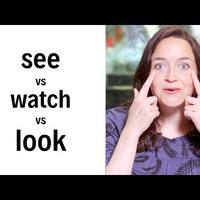See vs Watch vs Look - English in a Minute
||||見る||||
verbo auxiliar||||||||
Sehen vs Watch vs Look - Englisch in einer Minute
See vs Watch vs Look - Inglés en un minuto
See vs Watch vs Look - L'anglais en une minute
See vs Watch vs Look - L'inglese in un minuto
見る vs 見る vs 見る - 1分でわかる英語
보기와 보기 - 1분 안에 끝내는 영어
See vs Watch vs Look - Angielski w minutę
See vs Watch vs Look - Inglês num minuto
See vs Watch vs Look - Английский за минуту
See vs Watch vs Look - Engelska på en minut
See vs Watch vs Look - Bir Dakikada İngilizce
See vs Watch vs Look - англійська за хвилину
See vs Watch vs Look - 一分钟英语
See vs Watch vs Look - 一分鐘英語
Hello! I'm Sam from BBC Learning English
and in this episode, we're going to look at the
|||episode||||||
ve bu bölümde de, Türkiye'deki
在這一集中,我們將看看
differences between 'see', 'watch' and 'look'.
||sehen|sehen||sehen
diferencias entre 'ver', 'mirar' y 'observar'.
「看」、「觀看」和「看」之間的差異。
All three are verbs
|||動詞
Los tres son verbos
Все три - глаголы
Üçü de fiil
and all three involve using your eyes.
|||включают||твоими|глазами
|||require the use|||
|||涉及到|||眼睛
|||erfordern|||
|||관여하다|||
|||関与する|||目
|||implican|||
and all three involve using your eyes.
y los tres implican el uso de tus ojos.
és mindhárom magában foglalja a szemed használatát.
その3つとも目を使う。
ve üçü de gözlerinizi kullanmanızı gerektirir.
并且这三者都涉及到使用你的眼睛。
這三者都牽涉到使用你的眼睛。
'See' can have many non-literal meanings,
||||некорректных|буквальный смысл|
perceive|verb modal|possess|numerous|not|exact interpretation|interpretations
||||非字面|字面|
||||nicht|nicht wörtlich|
||||비유적|비유적인|
||||非字面||含义
||||недослівних||
||||非|非文字通り|
'See' can have many non-literal meanings,
見る」には、文字以外の意味がたくさんある、
'See' pode ter muitos significados não literais,
"Görmek" kelimesinin gerçek olmayan birçok anlamı olabilir,
'Xem' có thể có nhiều ý nghĩa không theo nghĩa đen,
“看”可以有很多非字面意义,
‘看’可以有很多非字面意义,
but its basic meaning is
||基本意思||
contrastive conjunction|its|fundamental|definition|is verb
||основное|значение|
pero su significado básico es
但它的基本意思是
'to have the ability to use your eyes'.
|||sposobnost||||
|possess|the|capability|infinitive marker|utilize|your|vision
'tener la capacidad de usar tus ojos'.
„hogy képes legyen használni a szemét”.
目を使う能力を持つこと』。
'gözlerini kullanma yeteneğine sahip olmak'.
‘有能力使用你的眼睛’。
I can't see anything!
I|cannot|perceive|object or detail
¡No puedo ver nada!
Nem látok semmit!
Я ничего не вижу!
Hiçbir şey göremiyorum!
我什么都看不见!
Or it can mean
||may|indicate
Vagy jelentheti
或者它可以意味着
'to notice something with your eyes'.
|observe|an object|using|your|sight organs
|notare||||
|notar||||
'notar algo con tus ojos'.
„észrevesz valamit a szemével”.
'bir şeyi gözlerinizle fark etmek'.
‘用你的眼睛注意到某件事’。
「用眼睛注意到某件事」。
Did you see the full moon last night?
|||||月亮||
past tense auxiliary verb|you|observe|the specific|entire|lunar body|previous|previous evening
|||||月||
|||||lua||
|||||луна||
¿Viste la luna llena anoche?
Láttad tegnap este a teliholdat?
Вы видели полную луну прошлой ночью?
Dün gece dolunayı gördün mü?
你昨晚看到满月了吗?
It was huge!
|было|огромное
the object|was|very big
||enorme
||非常大!
||è stato enorme!
||¡Fue enorme!
¡Era enorme!
Era enorme!
Она была огромной!
Çok büyüktü!
它好大!
To 'look' means
infinitive marker|verb form|definition of
‘Mirar’ significa
A „nézni” azt jelenti
'to turn your eyes towards something
|||глаза|к чему-то|
toward|direct|your own|gaze|in the direction of|object of focus
||||em direção a|
||||ka|
||||zu|
||||朝向|
|Volver||||
‘volver tus ojos hacia algo
'hogy valami felé fordítsd a szemed
"virar os olhos para algo
'gözlerinizi bir şeye doğru çevirmek
so that you can see it'.
in order to|in order to|you|are able to|perceive|the object
para que puedas verlo’.
hogy láthassa'.
para que o possas ver".
这样你就能看到它了。
They said that if I look carefully at the painting,
||||||||(определенный артикль)|картина
they|they stated|that clause|conditional conjunction|I|examine|with attention|the painting|the specific|artwork
|||||||||絵画
|||||||||畫作
Dijeron que si miro cuidadosamente la pintura,
Azt mondták, ha figyelmesen megnézem a festményt,
Они сказали, что если я внимательно посмотрю на картину,
Resme dikkatlice bakarsam,
他们说,如果我仔细观察这幅画,
他们说如果我仔细看这幅画,
I can see a flower.
||увидеть||цветок
I|am able to|perceive|a single|a blossom
||||花
||||flor
||||我看到花。
أستطيع أن أرى زهرة.
puedo ver una flor.
Egy virágot látok.
Я вижу цветок.
我能看到一朵花。
And 'watch'
also|observe
Y 'observa'
is to 'look at something for a period of time'
||||etwas|||||
verb|infinitive marker|gaze|at|an object|for|a|duration|of|duration
|~에||||||기간||
ist 'etwas für eine Weile anzusehen'
es 'mirar algo durante un período de tiempo'
は「一定期間何かを見る」ことである。
'bir şeye belli bir süre bakmak'
是“注视某物一段时间”
- really looking carefully.
||внимательно
||genau
very|examining|with great attention
- wirklich genau hinschauen.
- realmente mirando cuidadosamente.
- realmente olhando com atenção.
- 真正仔细地看。
Right now, you are watching this video
at this moment|at this moment|you|am|viewing|this video|this video
Im Moment schauen Sie sich dieses Video an.
Ahora mismo, estás viendo este video.
现在,你正在观看这个视频
and paying very close attention, I'm sure.
|обращая||внимательное|внимание||
while|paying|extremely|careful|focus|I am|confidently believe
|prestando atenção|||||
|非常注意|||密切注意||
|||genau|||
|주는|||||
|注意を払って|||||
そして細心の注意を払っているのは確かだ。
ve eminim çok dikkat ediyorlardır.
và tôi chắc chắn là rất chú ý.
并且我确信会非常关注。
我相信你们会非常注意。

